Dr. Richard Rink recognized for lifetime contributions as pioneer in pediatric urology
When Richard Rink, MD, recently received the American Academy of Pediatrics Medal in Urology—the world’s highest honor in the specialty—he made it clear he sees it as recognition of excellence for the entire pediatric urology team at Indiana University School of Medicine and Riley Hospital for Children at IU Health.
“Those kinds of awards don’t happen without outstanding people surrounding you,” said Rink, a pioneer in the field who joined the faculty in 1985 and founded IU’s top-ranked Pediatric Urology Fellowship. “I set out to get the best possible talent in the United States to Riley. And we have.”
Currently No. 3 in its national ranking by U.S. News and World Report, the pediatric urology program at Riley is IU Health’s top-rated program.
“IU is known as one of the best and most competitive fellowships for pediatric urology and is one of the places that almost always ranks in the top three for pediatric urology care,” said Michael Koch, MD, chair of the Department of Urology at IU School of Medicine. “We’re ranked higher than Johns Hopkins and Mayo Clinic. Other pediatric urology leaders around the country at institutions like Vanderbilt, Cornell and Cleveland have trained here.”
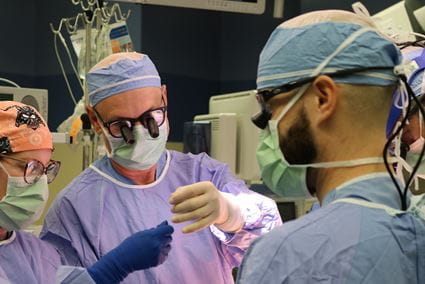 Rink, professor emeritus of pediatric urology, has helped train about two dozen fellows, many of whom have gone on to major leadership roles in the field, including Elizabeth Yerkes, MD (2001), the current president of both the Societies for Pediatric Urology and the American Association of Pediatric Urologists.
Rink, professor emeritus of pediatric urology, has helped train about two dozen fellows, many of whom have gone on to major leadership roles in the field, including Elizabeth Yerkes, MD (2001), the current president of both the Societies for Pediatric Urology and the American Association of Pediatric Urologists.
Nearly four decades into his career, Rink still works a full schedule as a key member of Indiana’s only pediatric urology group and performs multiple surgeries a week, often with trainees in attendance taking note of the legend’s surgical skill and compassionate care.
“He is a phenomenal surgeon,” Koch said. “He’s technically very, very gifted in a way you don’t see very often. He’s mentored many faculty, as well as residents and fellows.”
Benjamin Whittam, MD, MS, associate professor of urology and an expert in the emerging field of robotic surgery, chose to come to Riley for a Pediatric Urology Fellowship following his residency at Vanderbilt University Medical Center “because of the surgical prowess and reputation of Dr. Rink.”
Now as colleagues, Whittam considers Rink a close friend and respected leader who has cultivated an environment where egos are set aside, patients come first, and everyone on the team is valued for their niche areas of expertise.
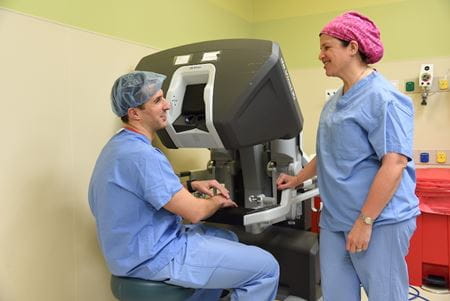 “Dr. Rink has taught by example—he is constantly reassessing his technique, outcomes and approaches and consistently asks for input from colleagues,” Whittam said. “His approach to leadership has created a division where we step up and help our partners—who are world leaders in their own special niches—to provide Hoosier children exceptional care across all nuances of pediatric urologic care.”
“Dr. Rink has taught by example—he is constantly reassessing his technique, outcomes and approaches and consistently asks for input from colleagues,” Whittam said. “His approach to leadership has created a division where we step up and help our partners—who are world leaders in their own special niches—to provide Hoosier children exceptional care across all nuances of pediatric urologic care.”
IU School of Medicine has assembled one of the largest and most diverse teams of pediatric urology experts in the United States and takes on more clinical care procedures than any other pediatric urology division in the nation, operating 17 clinics throughout Indiana. Now IU has the nation’s first training program for pediatric urology nurse practitioners.
“There’s not a pediatric urologist in the world who doesn’t know what Riley is,” said Rosalia Misseri, MD, the division chief and Robert A. Garrett Professor of Pediatric Urologic Research.
Building a reputation for excellence
Among other innovations, IU is known for developing the standard for surgical procedures in lower urinary reconstruction for children with spina bifida.
“We’ve seen remarkable advances in that group of patients,” Rink said. “Kidney failure used to be the leading cause of death in spina bifida patients, which almost never happens today. We have been a leader in this dramatic change.”
As a result, the life expectancy for children with spina bifida has nearly doubled over the last 20 years, now averaging a 40-year lifespan. This has led to the emerging field of transitional urology—when a pediatric patient transitions to adult urologic care—a field in which Misseri is among the nation’s foremost experts.
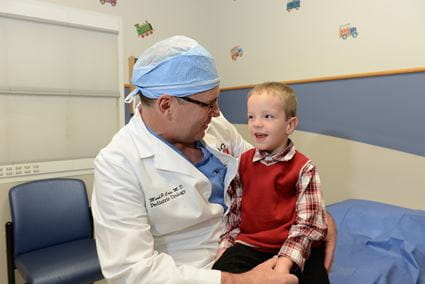 She stepped into division leadership in 2019, following Mark Cain, MD, who assumed the role of chief from Rink in 2012 and was on faculty at IU for 23 years before taking a leadership position at the University of Washington School of Medicine and Seattle Children’s Hospital. Cain is returning to IU at the end of the year and will serve as surgeon-in-chief at Riley Hospital.
She stepped into division leadership in 2019, following Mark Cain, MD, who assumed the role of chief from Rink in 2012 and was on faculty at IU for 23 years before taking a leadership position at the University of Washington School of Medicine and Seattle Children’s Hospital. Cain is returning to IU at the end of the year and will serve as surgeon-in-chief at Riley Hospital.
“He (Cain), like Dr. Rink, is quite skilled clinically, and his leadership skills are probably even more valuable to Riley than his outstanding surgical skills,” Koch said.
Kirstan Meldrum, MD, has also returned to faculty after 10 years in private practice and brings reconstructive surgical expertise to the team.
Martin Kaefer, MD, who joined the faculty in 1998, has developed a pediatric urology mission program in Guatemala known as one of the best internationally sustained programs of any university in that country. His team has performed over 500 complex surgeries in Guatemala in the last 20 years, and many IU urology residents have participated in this global health learning experience.
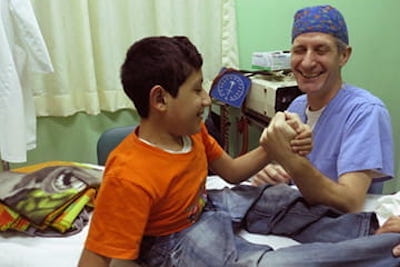 Along with the expertise of longtime faculty, IU’s pediatric urology team has grown to include experts in robotic surgery, pediatric stone disease, transitional care, gender health and affirmation and long-term outcomes research in patients with neurogenic bladder and other urologic conditions.
Along with the expertise of longtime faculty, IU’s pediatric urology team has grown to include experts in robotic surgery, pediatric stone disease, transitional care, gender health and affirmation and long-term outcomes research in patients with neurogenic bladder and other urologic conditions.
“Our program started with this outstanding commitment to offering the kids in the state of Indiana the best care possible, going out and attracting the best minds in pediatric urology to train here and come on faculty—and now we are building upon that foundation of excellence,” Misseri said.
Back in medical school, her interest in the field was sparked after reading the chapter on pediatric urology written by IU/Riley faculty in Campbell Walsh Wein Urology, considered the bible of urology for trainees. Rink has been involved in every edition update. During his 38 years in the field, Rink has published more than 300 scholarly articles and 50 book chapters helping define and fine-tune the principles of pediatric reconstructive urology surgery.
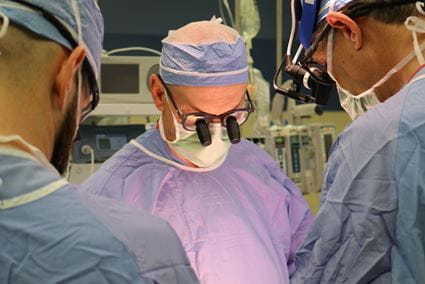 He and his team have performed over 850 bladder augmentation surgeries. In addition to his robust clinical schedule, Rink continues to present at national and international conferences, along with other members of IU’s pediatric urology team.
He and his team have performed over 850 bladder augmentation surgeries. In addition to his robust clinical schedule, Rink continues to present at national and international conferences, along with other members of IU’s pediatric urology team.
“His energy, precision and quest for perfection are inspiring,” Misseri said. “He talks about the ‘movie in his mind’ and visualizing the steps of a surgery. His passion goes beyond the surgery to thinking about the child and what we can we do to get this child to be as healthy and functionally normal as we can.”
IU’s pioneering history in pediatric urology
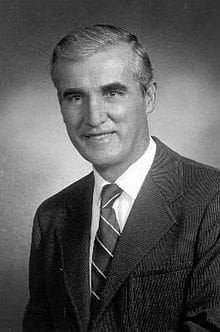
IU School of Medicine boasts a rich history in urology dating back to the 1880s.
“IU has constantly brought innovations in surgical techniques and other technologies to the field,” Koch said.
In adults, a cure for testicular cancer came through the surgical innovations of John P. Donohue, MD, combined with a new platinum-based chemotherapy developed by Lawrence Einhorn, MD.
Rink remembers meeting Donohue while working at Wishard Hospital (now Sidney & Lois Eskenazi Hospital), where Rink started as a teenage orderly before moving into nursing functions and learning to stitch up lacerations in the emergency room—without any formal medical training.
“I knew I wanted to be a surgeon,” Rink said. “When I met John Donohue, he was one of those larger-than-life figures, and I thought if I could be anything like he was, that would be amazing.”
During his time as Department of Urology chair, Donohue supported the development of a pediatric division and hired Michael Mitchell, MD, to lead it. Previously, urologic surgery in children was handled by adult urologists or general pediatric surgeons.
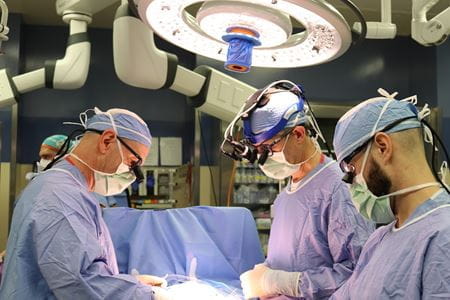
Rink would become the program’s second faulty member. During his urology residency at IU, Mitchell asked him to complete a fellowship at Boston Children’s Hospital (Harvard Medical School) and then return to IU to join the pediatric division. At Harvard, Rink trained under Alan Retik, MD, and Hardy Hendren, MD, pioneers in the field who, along with Mitchell, would go on to receive the AAP Medal in Urology—an elite honor now received by their mentee Rink.
“I had the best training in the world at the time,” Rink said. “I’m blessed to have had all three of my mentors be medal winners in pediatric urology. There’s not a day that goes by that I don’t think of something one of those three told me. They all had incredibly skilled hands.”
Together, Rink and Mitchell received national acclaim for their discoveries in reconstructive surgery.
“We now have the premier reconstruction program in the world, without question,” Rink said.
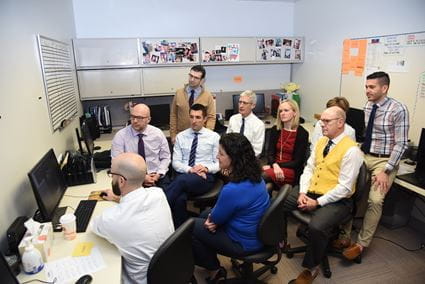 In 1989, Rink became the pediatric division’s second leader—a post he held for 25 years. For a brief time, he was the only pediatric urologist in the state of Indiana.
In 1989, Rink became the pediatric division’s second leader—a post he held for 25 years. For a brief time, he was the only pediatric urologist in the state of Indiana.
He quickly set to work on building out a team.
“He just had a knack for recruiting really strong clinical surgeons who were all innovative in their own right,” Koch said.
Rink built a team that is competitive nationally—but not with each other—and intentionally fostered a culture of peer learning.
“If you recruit someone who is really bright and wants to treat patients well and then put them in a group that’s super talented, everyone thrives,” he said.
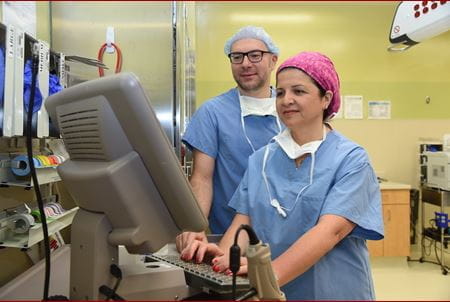 While Rink has much to offer his junior colleagues, he also enjoys learning from them. He helped recruit Konrad Szymanski, MD, MPH, the 2014 fellow, who is now an assistant professor of urology and is known around the globe for his innovative research in quality of life for children and adults with spina bifida. Joshua Roth, MD, the 2019 fellow, is an assistant professor of urology whose professional interests include adolescent and transitional urology, LGBTQ+ health and wellness, and gender affirmation. Pankaj Dangle, MD, MCh, MS, is an expert in kidney stone disease and robotic surgery.
While Rink has much to offer his junior colleagues, he also enjoys learning from them. He helped recruit Konrad Szymanski, MD, MPH, the 2014 fellow, who is now an assistant professor of urology and is known around the globe for his innovative research in quality of life for children and adults with spina bifida. Joshua Roth, MD, the 2019 fellow, is an assistant professor of urology whose professional interests include adolescent and transitional urology, LGBTQ+ health and wellness, and gender affirmation. Pankaj Dangle, MD, MCh, MS, is an expert in kidney stone disease and robotic surgery.
“It’s a phenomenal team,” Misseri said. “I would say one of the best in the world.”
